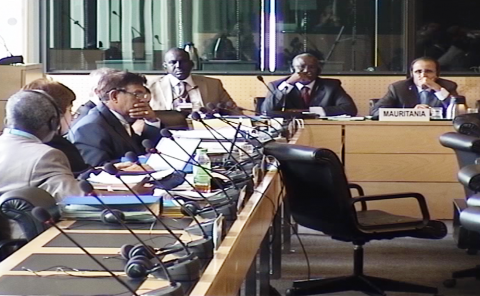
(Geneva, July 5, 2018) – In the context of the periodic review of Mauritania by the UN Committee against Torture (CAT), which is set to take place on July 24 and 25, 2018, Alkarama submitted its shadow report on June 25, 2018. In its report, Alkarama highlighted several violations of provisions of the Convention against Torture and Other Cruel, Inhuman or Degrading Treatment or Punishment (UNCAT), which Mauritania ratified in 2004.
Alkarama’s report emphasised several issues, including the establishment of an exceptional legal procedure for counter-terrorism matters, the incorporation of corporal punishment into the Penal Code, impunity for past crimes, and the lack of independence of the National Commission on Human Rights (CNDH). Alkarama proposed a series of recommendations on the steps the authorities should take to prevent and combat torture in the country.
Since its last CAT review, Mauritania adopted Law no. 2015-033, focussed on combatting torture, which contains a definition of torture that conforms with article 1 of the UNCAT. While this law represents a significant step towards combatting and preventing torture in the country, Mauritanian legislation still contains provisions that contradict both the UNCAT and Law no. 2015-033.
Lack of judicial protection in the context of the fight against terrorism
While Law no. 2015-033 guarantees the right to access a lawyer from the moment of arrest, the Code of Criminal Procedure states that access to a lawyer is not possible until after the first extension of the initial period of custody, and even then only upon the authorisation of the prosecutor. This period of custody can last between 48 hours for crimes of common law and 45 days for individuals arrested for crimes of terrorism, exposing them to a high risk of secret detention and torture.
Corporal punishment, torture and the death penalty
Mauritania’s Penal Code prescribes measures of corporal punishment prohibited under international law and amounting to torture.
Despite the de facto moratorium on the death penalty in force since 1987, during a plenary session on April 27, 2018, the National Assembly adopted a law prescribing harsher penalties for blasphemy and apostasy. Individuals found guilty are now mandatorily sentenced to death.
This reform is directly linked to the judicial proceedings against blogger Mohamed Cheikh Ould Mkhaïtir. He was condemned to death in 2014 by the Criminal Court of Nouadhibou after having published on Facebook a text judged “blasphemous” in which he denounced the use of religion to justify discriminatory practices against the so-called “forgerons”, seen as a lower caste in the country.
On November 9, 2017, his sentence was reduced on appeal to two years’ imprisonment. Despite this decision, he continues to be detained in secret. The Mauritanian authorities informed the Committee on the Elimination of Racial Discrimination (CERD) that he was held “in administrative detention for his own security”.
Impunity for crimes committed against minority groups
Violations committed against the “Afro-Mauritanian” officers accused by the authorities of planning a coup d'état have never been the subject of an exhaustive, independent and impartial investigation. The perpetrators of the acts of torture, enforced disappearances and extrajudicial executions committed at the end of the 1980s and beginning of the 1990s were given amnesty by Law no. 93-23 of June 14, 1993. As such, the law violates the principle of the imprescriptibility of the crime of torture included in the 2015 law against torture.
The authorities do not deny the existence of these grave violations, commonly referred to as “unresolved humanitarian issues”. However, the victims, their relatives and activists who denounce impunity and demand investigations and prosecution are regularly subjected to reprisals by the authorities.
Lack of independence of the National Commission on Human Rights
In its report, Alkarama also raised the lack of independence of the CNDH, the National Human Rights Institution (NHRI) of Mauritania. The CNDH is mandated to carry out unannounced visits to all prisons and detention facilities to monitor the authorities’ respect for the rights of people deprived of their liberty. Nevertheless, it appears that the CNDH is not fulfilling its mandate in this regard.
Following its review of the CNDH in November 2017, the Subcommittee for Accreditation (SCA) of the Global Alliance for NHRIs (GANHRI) recommended that the CNDH should be downgraded from status A to status B due to its lack of conformity with the Paris Principles.
The SCA highlighted the opacity of the selection process of members as well as its lack of independence vis-à-vis the executive. For example, the CNDH published a declaration in favour of the death penalty against Mohamed Cheikh Ould Mkhaïtir.
For more information or an interview, please contact media@alkarama.org (Dir: +41 22 734 10 06)
